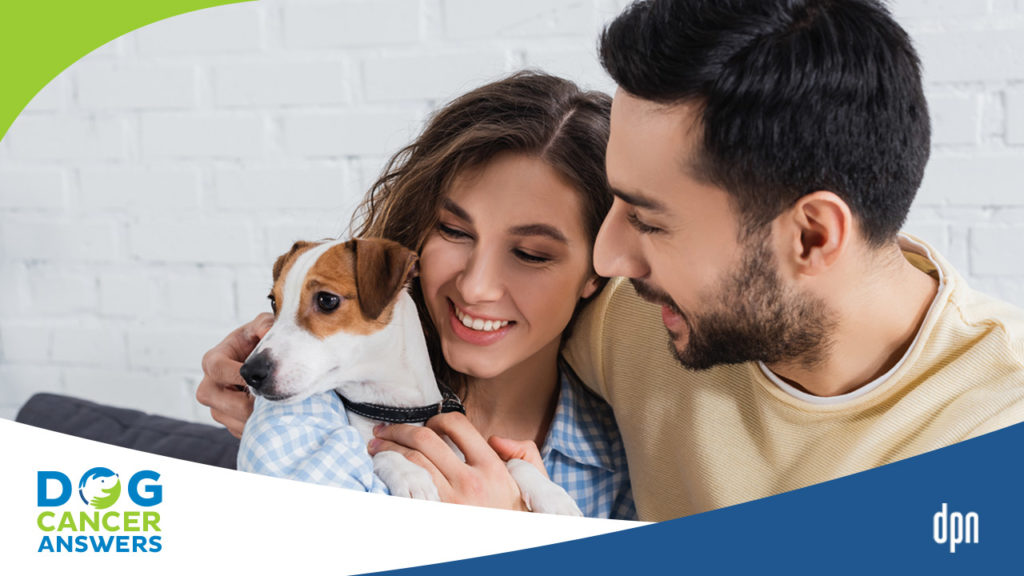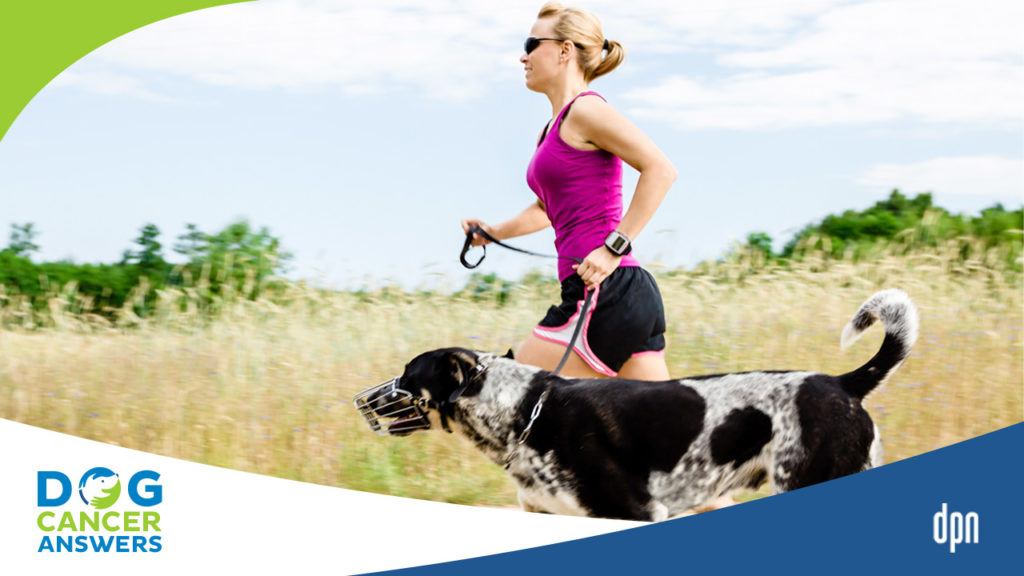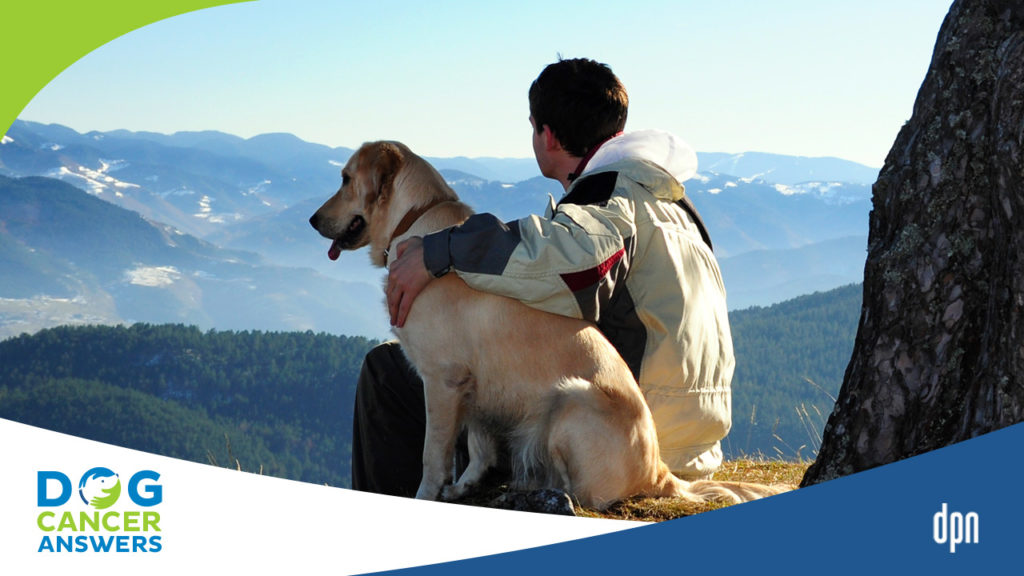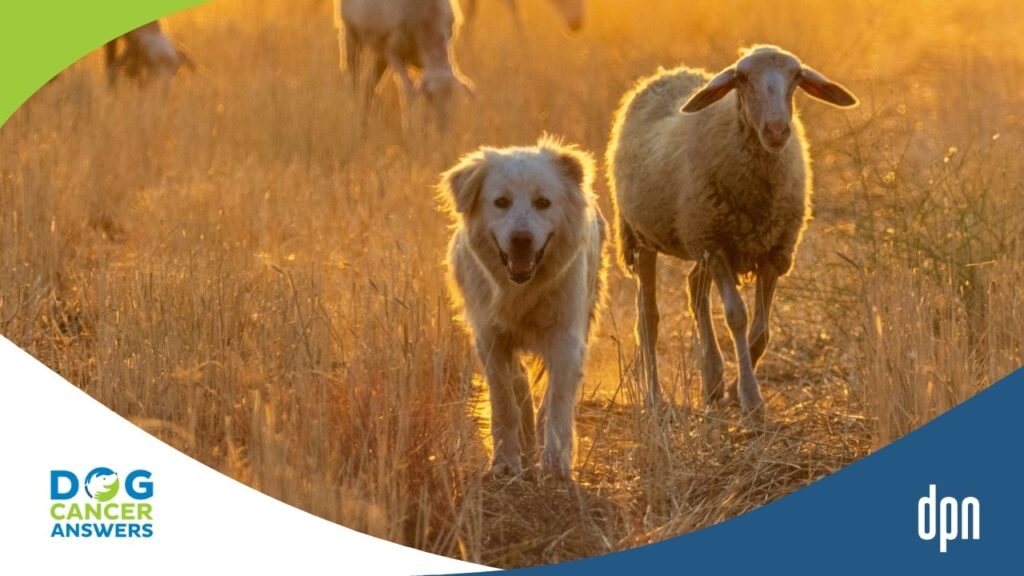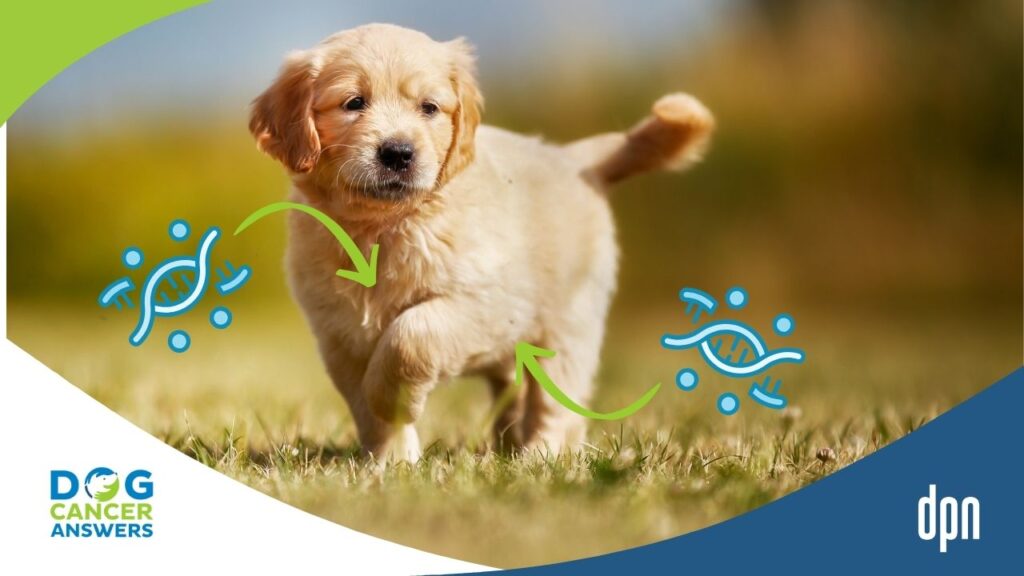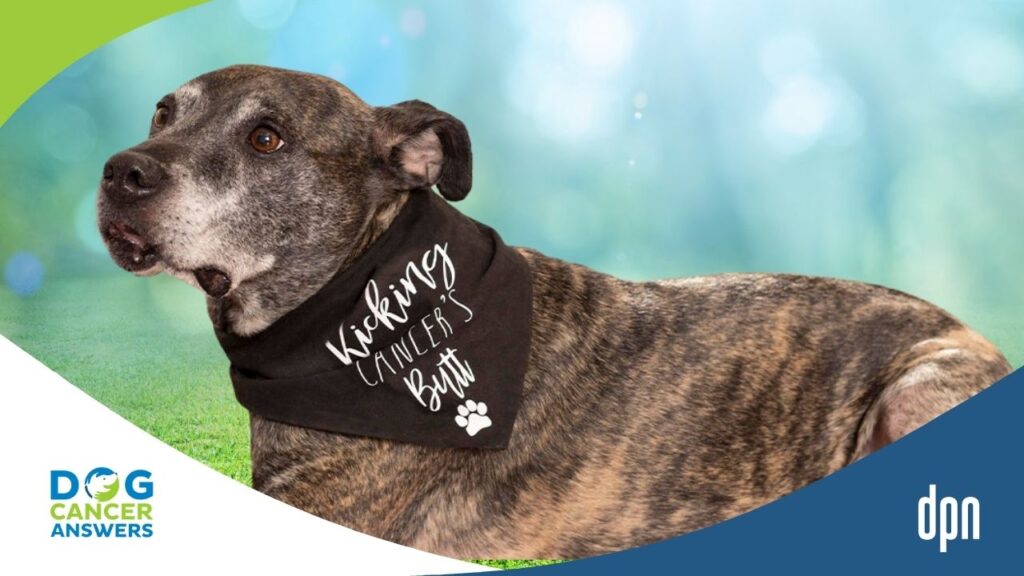EPISODE 134 | RELEASED September 27, 2021
How Type C for Comfort Treats Dog Cancer | Molly Jacobson Deep Dive
Type C dog lovers put Comfort first. You probably do not tolerate side effects and want to keep your dog as comfortable and pain-free as possible.
SHOW NOTES
When your dog is diagnosed with cancer, you have lots of information to process and lots of decisions to make. What is the prognosis? Can the tumor be removed with surgery? Will chemotherapy or radiation help to extend your dog’s life, and are they worth the cost, both financially, physically and emotionally? And how are you going to pay for this?
According to Dr. Demian Dressler’s Dog Cancer Coping Guide, dog lovers tend to fall into three personality categories when addressing these concerns and making treatment decisions:
- A for Action
- B for Balance
- C for Comfort
As a Type C owner, you put comfort first. You are more likely to decline specific treatment options if you are concerned about your dog being in pain or experiencing side effects and will focus on treatment options that relieve symptoms and keep your dog happy. You’re the most likely to immerse yourself in diet changes to help your pooch, and will likely add supplements to help target your dog’s symptoms and maybe fight the cancer.
Molly Jacobson, editor of The Dog Cancer Survival Guide, joins us to help Type C folks get comfortable with their treatment plan.
[00:00:00] >> James Jacobson: Today’s sponsor is the Dog Cancer Survival Guide, a must read book if your dog has cancer. To get a free excerpt on what to feed your dog, go to DogCancerDiet.com. You’ll get Dr. Demian Dressler’s dog cancer diet and help your dog with their next meal. That’s DogCancerDiet.com to get an excerpt for free of the Dog Cancer Survival Guide.
[00:00:27] >> Molly Jacobson: Personality Type C for comfort can often feel like they’re being judged by other types.
They see other people whose dogs are facing the same diagnosis, doing lots more treatments sometimes. And they think that that person’s "doing more" for their dog. And then they think maybe I’m giving up on my dog. And I really want to encourage you that if you’re a C for comfort, you know that giving up on your dog has nothing to do with how much money you spend, or how many treatments you throw at that cancer.
[00:01:02] >> Announcer: Welcome to Dog Cancer Answers, where we help you help your dog with cancer. Here’s your host, James Jacobson.
[00:01:10] >> James Jacobson: Hello friend, and welcome to Dog Cancer Answers. So you think you are a Type C and you want to comfort your dog and provide the most comfort possible. Well then this episode is for you. It comes from our series on what personality type are you and how to use that personality type to help your dog as you battle cancer. Molly, thanks for joining us for this episode where we will explore everything that a personality Type C needs to know.
[00:01:44] >> Molly Jacobson: Well, thank you for having me.
[00:01:45] >> James Jacobson: So a little background on this comfort care personality type. They are willing to tolerate minor side effects, but they get pretty upset quickly if they’re starting to see side effects from the different treatments that anyone could be suggesting for their dog. They value life quality over longevity.
[00:02:07] >> Molly Jacobson: Yes.
[00:02:07] >> James Jacobson: Basically, that’s the essence of it. Quality of life uber alles. What kinds of treatment do Type C people pursue?
[00:02:17] >> Molly Jacobson: Well, they might pursue any of the available treatments to them, but they’re always going to be wondering about side effects before anything else.
So this is the person who might rule some things out completely that they associate with heavy side effects, like chemotherapy, which a lot of people assume has a lot of side effects. And it can for humans, for sure. For dogs they usually give very low doses so they don’t experience as many side effects, but even still, the fact that 20% of dogs on chemo will experience side effects is usually enough for Type C for comfort types to say, "Nope!"
So even that, those chances just feel a little too high for them. They just don’t want to risk it. These are the folks who, when they change a dog’s food over and the dog has diarrhea, will get really concerned and really want to address it, not after a few days, but like immediately. Like one episode of diarrhea, one little episode of vomiting is too much for them.
And I don’t mean to minimize that. Like, it may have sounded like I was just minimizing – oh, it’s just a little episode. I personally, I don’t like to vomit. It is not fun. I think that one vomit is too much too.
[00:03:37] >> James Jacobson: I don’t think you’re unique. But yeah, it actually can be pretty bad. And if you’re really focusing on quality of life, the fact that you are vomiting and going through that, or having diarrhea, or anything that is just considered usually kind of a mild thing, that truly reduces the quality of life for your dog, especially when it may be only a few days left.
[00:04:01] >> Molly Jacobson: Well, exactly. And so sometimes, like let’s say that they’ve gotten, uh, a longer prognosis than a few days and their dog is feeling ill. They’re thinking, "Oh my God, my dog is going to still be alive six months from now, but they’re having diarrhea every day? That’s no way to live."
So they’re really looking at side effect management. Whether it’s from a treatment or from the cancer itself, their focus, their first focus usually, is on how do I address side effects to make sure my dog is as comfortable as possible. So I wouldn’t say any treatments are necessarily off the table altogether, but they are not going to do something that is going to cause a lot of side effects that can’t be managed unless they know that it’s really going to help their dog in the long run.
[00:04:49] >> James Jacobson: What are the most common things for a Type C to do?
[00:04:54] >> Molly Jacobson: Well, I think most type C’s would at least consider a surgery because it’s still the standard of care.
[00:05:00] >> James Jacobson: Even though there are side effects.
[00:05:01] >> Molly Jacobson: Well, the side effects from surgery are by definition, pretty limited, right? Like obviously there are anesthetic risks, hopefully that doesn’t happen. That might be enough in certain dogs. Like if a dog has a-
[00:05:12] >> James Jacobson: An older dog?
[00:05:13] >> Molly Jacobson: An older dog who has a heart condition, maybe, and you know that your dog has a heart condition, you might say, if you’re Type C, you might say, Nope, surgery’s off the table, not going to put her through it, not going to take that risk. But if your dog is otherwise healthy, you know their lungs are clear, their heart’s good, they’re eating well, they’re generally perky dogs and they don’t act sick. Then you might be willing to put them through a surgery, have them heal for the, you know, 10 days to 14 days, making sure that they’re very, very well cared for, and they’re, they’re the people who will do all of the pain meds as recommended. There are a lot of people who don’t give their dogs the pain meds upfront. They think, oh, I don’t think my dog’s in pain because my dog’s not crying. And so they don’t give their dog the pain med as prescribed. And then this Type C person’s like, no, like I’m assuming, my dog just was through surgery, so I’m going to give him the pain medication.
[00:06:10] >> James Jacobson: Give him all the meds.
[00:06:11] >> Molly Jacobson: Yeah, like, do the comfort care. Right? And they’ll do that, and then they will-
[00:06:15] >> James Jacobson: But surgery, is that a common thing for Type C people?
[00:06:18] >> Molly Jacobson: I would say that most Type C people will consider it. And then, depending on the circumstances, they’re less likely to choose to do surgery than the other two types, but I wouldn’t say that it’s something they wouldn’t do.
[00:06:31] >> James Jacobson: Where do Type C’s spend most of their treatment dollars, and treatment time?
[00:06:37] >> Molly Jacobson: I think Type C’s really like to spend dollars on things that are really life quality enhancing. Food. Like Type C’s definitely like to do the home cooking that Dr. Dressler recommends because-
[00:06:50] >> James Jacobson: I’ll take a filet mignon for my dog.
[00:06:52] >> Molly Jacobson: Exactly!
They’re like, that’s money well spent because my dog is going to enjoy it. It’s going to be, it is, it is a way to fight cancer, right, through the diet is a way to fight cancer. It’s a totally legitimate, it’s the fourth step in full spectrum care for a reason. It has an effect on the body, it matters, and it’s food and dogs like food.
And so it’s fun to feed your dog food that they like. They see the dog light up and they’re thrilled. So they’ll often do food. They usually do supplements, because supplements, especially the ones that Dr. Dressler recommends, have no side effects most of the time, like with very, very rarely. And even then it’s usually just a dog just needs to get used to, it just takes a day to adjust to the supplement.
Um, these are the people who really take seriously the idea of slowly phasing out kibble and phasing in the dog cancer diet. You know, they start low and slow with all the supplements they add, so that the dog doesn’t get sick, you know? They just are very, very careful to make sure that any change they do is slow and methodical.
They take lots of notes about side effects, which is actually really helpful for their veterinarian to help troubleshoot if something does become something they can’t manage at home.
[00:08:08] >> James Jacobson: What situations drive a C personality type, a comfort personality type crazy?
[00:08:14] >> Molly Jacobson: If they know their dog’s in discomfort. If they know that their dog is in pain, if their dog isn’t eating, if their dog is having any kind of GI upset, really, really affects their ability to, I mean, it’s just, it’s horrible.
It’s very upsetting. When I learned Shiatzu as a massage therapist many years ago, one of the things I learned about Eastern medicine is that the mindset is different than- in Western medicine we want to get in there, we want to solve the problem, and we want long life. So when it comes to chronic illness, we’ll sort of, take a longer life that maybe has more disability in it.
Whereas in Eastern medicine, you take care of yourself every day proactively. And what you want is a really healthy life right up until, and then a quick decline. Like they would rather have, they would rather feel really good and then die over the course of two weeks, than uh, over the course of 10 years.
[00:09:11] >> James Jacobson: Any coping tips for a personality Type C?
[00:09:15] >> Molly Jacobson: I think that personality Type C for comfort can often feel like they’re being judged by other types. They see other people whose dogs are facing the same diagnosis doing lots more treatments sometimes. And they think that that person’s "doing more" for their dog. And then they think maybe I’m giving up on my dog.
And I really want to encourage you, that if you’re a C for comfort, you know that giving up on your dog has nothing to do with how much money you spend or how many treatments you throw at that cancer. In my mind, this is my opinion, if you’re giving up on your dog, the only way you can do that is by not being present to your dog.
Is by actually just leaving your dog, you know, like, treating your dog like an object, which I think sometimes people can do. They can, sort of lose track of why they’re doing all of the things they’re doing and not pay attention to the relationship. That’s never going to be your issue, Type C.
[00:10:18] >> James Jacobson: Because yeah, you’re focusing on quality of life-
[00:10:21] >> Molly Jacobson: Yeah.
[00:10:21] >> James Jacobson: -and comfort.
[00:10:22] >> Molly Jacobson: And what’s the best for a dog, quality of life? Being with you. That’s it!
[00:10:26] >> James Jacobson: Just cuddling sometimes, just loving-
[00:10:28] >> Molly Jacobson: Sometimes just cuddling or-
[00:10:29] >> James Jacobson: -spending the time you have together.
[00:10:31] >> Molly Jacobson: And spending it together, doing the things you love. So for someone who’s a Type C for comfort, for example, someone in our Facebook group just posted a couple of weeks ago, pictures of herself hiking with her dog.
And her dog was not very mobile. Like he is definitely suffering from cancer, but also some arthritis, but this dog loves to hike. So even though he can only do a little part of the trail, she still gets him in the car, leashes him up, takes him to the trail and they do a hundred yards. He used to be able to do miles, now they do a hundred yards. And for her, that’s her quality of life treatment for him. Until the day he dies, she is taking him to the trail. Even if he can’t walk, she’s still going to do this, because from her point of view, that’s the point of him being alive, is that she is able to give him that experience every day.
And so somebody else might say, oh, well, he can’t handle it anymore, so I’m not going to take him. A Type C would say, no, this is what my dog needs.
[00:11:35] >> James Jacobson: Even if it’s just a short distance, do it, take pictures, have those conversations with your dog. Do the things that enhance, not only your dog’s quality of life, but your quality of life, and your memory, because as we said in the intro to this series, so much of this has to do with having no regrets. Being able to look back on this time and say, I did what I needed to do, and it made sense at the time, and I don’t have any regrets. If you’re a Type C personality, make sure you are doing those things, not necessarily the treatments, the diet and the surgery and the supplements, but make sure that you are doing the things that nourish your soul and your memory, and honor your time with your dog, because that’s an important part, I would think, if you’re focusing on comfort care.
[00:12:27] >> Molly Jacobson: Absolutely. And focusing on comfort doesn’t mean you don’t treat, you know, it just means that your focus is on comfort.
[00:12:36] >> James Jacobson: That’s the most important.
[00:12:36] >> Molly Jacobson: That’s the most important thing in your mind. And it doesn’t mean that, you know, you might be willing to tolerate a few side effects that are limited, and very short in duration. But in order for you to look back five years from now and not regret, you’re going to want those memories that we make with dogs.
You know, every dog that I’ve ever known, like right now in my mind, I have all of these scenes flashing through my mind of, just, every day. Like my dog Timmy, when I was eight, spraying him with a hose, ’cause he liked to catch the raindrops. Like that’s such a vivid memory for me. And that’s the kind of thing that if you have those, you’re going to look back with no regrets. As long as you know that that dog had a good time with you, and you had a good time with him or with her, then you’re going to feel like a success as a dog owner.
[00:13:28] >> James Jacobson: Really good advice for Type C comfort care folks. If you’re listening to this and thinking, yeah, that’s me, but I don’t know, maybe I would do something a little different and maybe a little more balanced or maybe a little more action…
Well, then you can listen to those episodes where Molly and I tease that out and we explore what those personality types do, including tips that they find helpful. And perhaps you may not be a C, but you can do that at any time by just going and listening to that episode. Also, I would encourage you to talk to our support group.
We have an amazing group of people just like you who are treating dogs with cancer. It’s on Facebook, it’s called Dog Cancer Support, and you can just go to Facebook and do a search for Dog Cancer Support, or just to go to your browser, any browser, and type in DogCancerSupport.com and it will redirect to our Facebook group, which is private and is just for people like you and me. Also, I want to encourage you to subscribe to Dog Cancer News, which is our newsletter that is free.
It comes out three times week with really useful, informative articles that are helpful for folks who are going through dog cancer. You can find that at DogCancerNews.com. Molly Jacobson, thanks for being with us today.
[00:14:50] >> Molly Jacobson: Thank you for having me.
[00:14:52] >> James Jacobson: And most of all, thank you for listening. I’m James Jacobson, from all of us here at Dog Podcast Network, I want to wish you and your dog a very warm Aloha.
[00:15:08] >> Announcer: Thank you for listening to Dog Cancer Answers. If you’d like to connect, please visit our website at DogCancerAnswers.com or call our Listener Line at (808) 868-3200. And here’s a friendly reminder that you probably already know: this podcast is provided for informational and educational purposes only.
It’s not meant to take the place of the advice you receive from your dog’s veterinarian. Only veterinarians who examine your dog can give you veterinary advice or diagnose your dog’s medical condition. Your reliance on the information you hear on this podcast is solely at your own risk. If your dog has a specific health problem, contact your veterinarian.
Also, please keep in mind that veterinary information can change rapidly. Therefore, some information may be out of date. Dog Cancer Answers is a presentation of Maui Media in association with Dog Podcast Network.
Hosted By
SUBSCRIBE ON YOUR FAVORITE PLATFORM
Topics
Editor's Picks
CATEGORY


